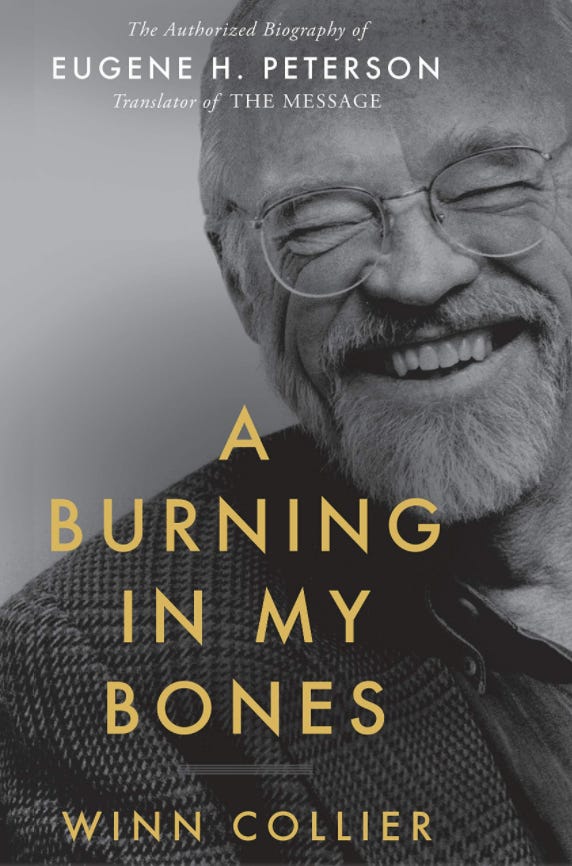I apologize for sending this a second time, but I meant for this to be open to the public.
Eugene Peterson: Pastors are not the Police
Eugene Peterson’s books more than his sermons or his pastoring morphed into his becoming a fount of wisdom for pastors and, oddly enough, for those who had big troubles with the church as institution.
Question for today: What has shaped you the most from Peterson?
Today we finish Winn Collier’s biography of Eugene Peterson called A Burning in My Bones (pp. 262-309; for the reading plan), which has been even better the second time through.
Do you have a suggestion for another book for reading through together?
He even said
There is no church I’m familiar with over the last 2000 years that I would be a member of if it were up to me … Yet I have little time for the anti-church crowd who seem snobbish (270).
He adds further:
The church I wanted or dreamt of or had a vision for got in the way of the church I had, the church God gave me (271).
He learned to pastor the people he had not the people he did not have or wanted to have. This approach to pastoring slows us down and teaches us what pastoring is. Many want the obstacle folks out and the loyal folks in, but pastoring is pastoring who you’ve got.
How have you learned this?
Another image: he says pastoring is not glamorous and he says “the less people notice you the better” (270). It’s like a good umpire at a baseball game. The best ones are the ones you did not notice. I wonder if this theory of Peterson’s is remotely even possible. How can they not be noticed? But, perhaps the rhetoric has the better day: do not pastors need to strive not to be the center of attention? Do they not at times get caught up in being the story itself?
What taught you this valuable lesson the most? Who taught it to you?
Souls, he says, can’t be hurried. There is no reason to impose anything on your congregation. Instead, he says, just live this way before them and bring them along. “I am their pastor, not their policeman.”
He wasn’t afraid of some controversies.
By the way, he said this of inerrancy. It’s the language of mathematics. You can’t say “I love you” in algebra. Worth thinking through.
He endorsed Rob Bell’s Love Wins.
He was tempted by universalism.
He thought the “emergent” group knew nothing about church apart from what they didn’t like.
He got into heat over the same-sex discussion and feared schism in the church and the mean-spiritedness of so many. He had no certainty on the topic.
As he aged he spent more time watching birds, he had trouble keeping weight on, his faith wasn’t as stable as he expected, he liked the quiet of his long obedience. In those years his son Eric said his dad was the holiest person he knew.





I am most struck by Eugene's unhurried nature; his willingness to sit in the present and be still with people. He seemed to always make time for what is most important -- people. I was sad to see this book end!
What shaped me the most about Peterson's life was the way he cared about people. He seemed unconcerned with changing them, and much more concerned with being with them and inviting them into the worship of God. The way he interacted with people will be one of the main things I take away from this book. Eugene Peterson was a pastor in every sense of the word.
Thanks for creating a place for us to discuss this book, Scot! This is the first time I've ever participated in an online book discussion, and I enjoyed it much more than I thought I would. I've enjoyed reading through the comments each week and it's been something I've looked forward to each Thursday.